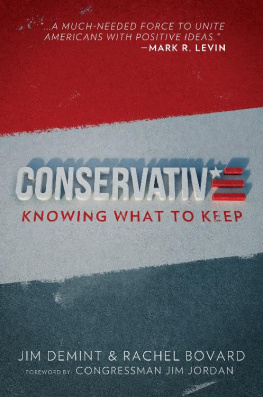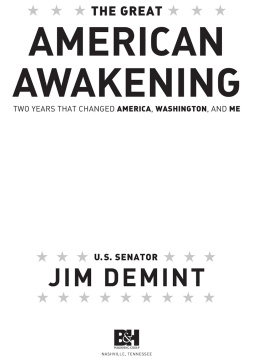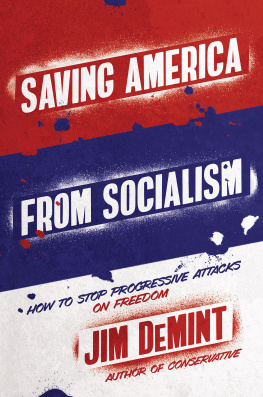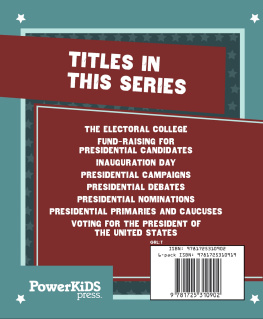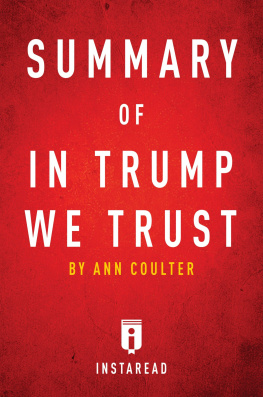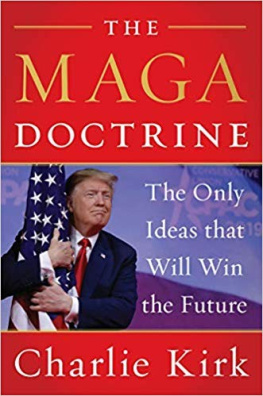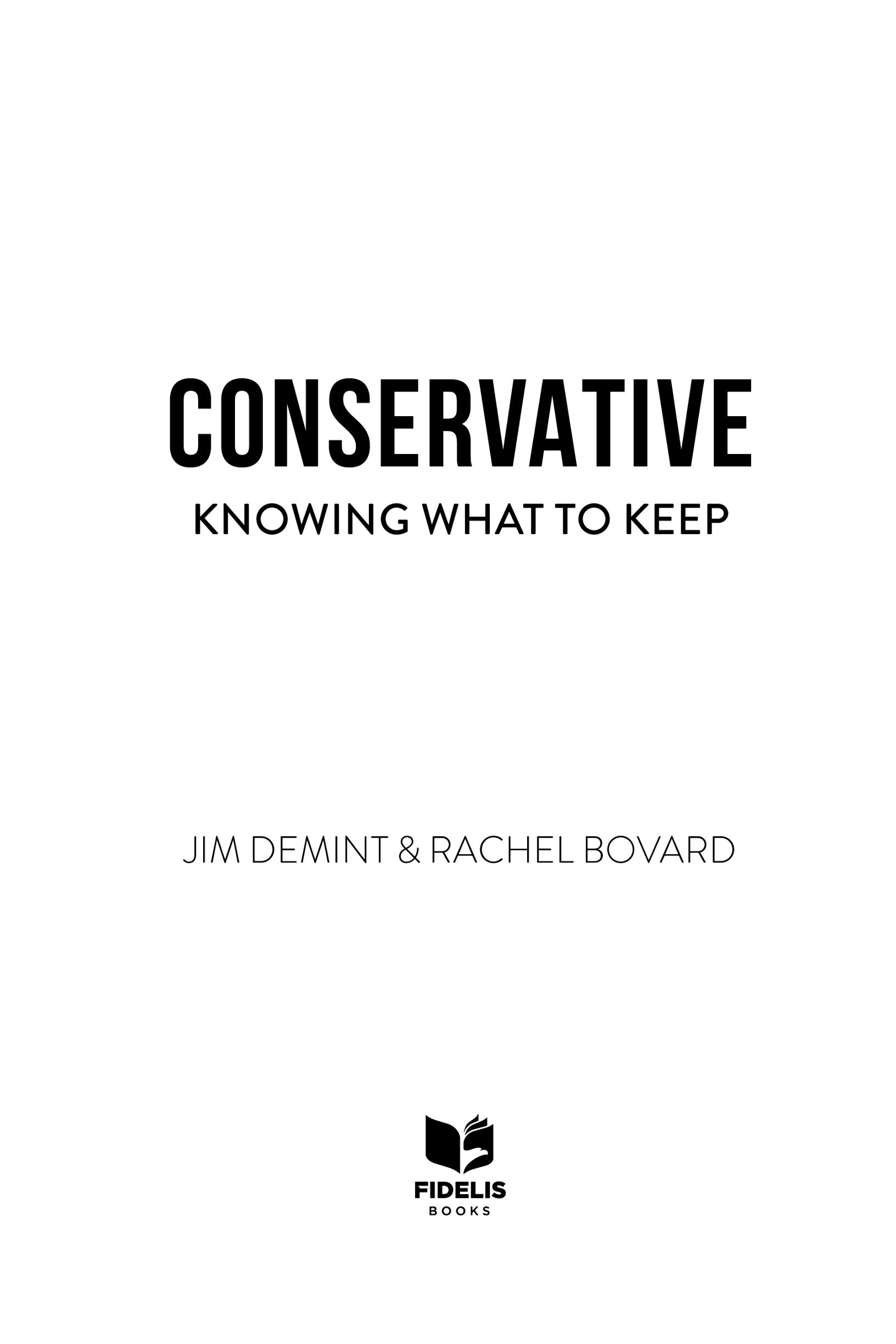
CHAPTER 2
Keeping Our Faith
It was religion that gave birth to the English colonies in America. One must never forget that [] I can see the whole destiny of America contained in the first Puritan who landed on those shores [] Despotism may be able to do without faith, but freedom cannot [] When a peoples religion is destroyed [] then not only will they let their freedom be taken from them, but often they actually hand it over themselves .
A LEXIS DE T OCQUEVILLE
When we think about what to keep it helps to put first things first. And the first thingthe one thing more important than everything elseis religion. Put simply, our relationship with Godincluding exercising ones choice not to have onedefines all our other relationships: with our families; our friends and neighbors; and even our country and governments. Freedom of religion secures our covenant as We the People with our fellow citizens and with God.
Your authors are ChristiansDeMint is evangelical, and Bovard is Roman Catholicso maybe youre thinking that while religion is important to us, its not necessarily to everyone or to the country as a whole. Religion, however, is essential to keeping everything we all care about, and you dont have to take our word for it.
There is a reason the first freedom singled out for special protection in the First Amendment to the U.S. Constitution was religious freedom: Congress shall make no law respecting an establishment of religion, or prohibiting the free exercise thereof []
Why would religion come first, even before freedom of speech, freedom of the press, or the freedom of peaceful assembly, which on the surface might seem to be more important to a healthy constitutional republic?
The father of the Constitution, James Madison, provided a hint of an answer in an essay he wrote in 1785, opposing a bill in the Virginia Legislature that would have provided government subsidies for Christian teachers:
It is the duty of every man to render to the Creator such homage and such only as he believes to be acceptable to Him. This duty is precedent, both in order of time and in degree of obligation, to the claims of Civil Society.
Precedent, Madison wrote, as in precedingcoming first. As Yuval Levin of the Ethics and Public Policy Foundation puts it: Religious liberty, in this view [] is not a freedom to do what you want, but a freedom to do what you must.
This is the key difference separating religion and religious freedom from other political concerns, both in the building of our own lives and in the making of public policy. As John F. Kennedy famously put it in 1962, To govern is to choose. But, when it comes to faithfully practicing ones religion, there is no choice. Evangelical Christians must accept Jesus Christ as their personal savior. Roman Catholics must attend mass on holy days of obligation. Practicing Muslims must fast during Ramadan and pray five times a day. Orthodox Jews must keep to a kosher diet. Pick any religion or denomination and youll find spiritual or practical red lines its adherents may not crossno matter what.
Most Americans not only understand this but embrace it. Partially, this is just good manners. After all, the United States has been an ethnically, culturally, and religiously diverse society since before we were one country. As we all know from our own life experiencesoften even within our own familiesthe best way to navigate diversity is with mutual respect and tolerance. As George Mason and his coauthors, including James Madison, affirmed in the Virginia Declaration of Rights in 1776:
Religion, or the duty which we owe to our Creator, and the manner of discharging it, can be directed only by reason and conviction, not by force or violence; and therefore all men are equally entitled to the free exercise of religion, according to the dictates of conscience; and that it is the mutual duty of all to practise Christian forbearance, love, and charity toward each other.
In this sense, Americas long tradition of religious freedom amounts to a society-wide agreement to protect everyones freedom of conscience by agreeing to infringe on no ones.
But, as our founders knew, and our history affirms, theres more to it than that.
Civic Order and Transcendent Order
Russell Kirk, our guide in knowing what to keep, insisted that a belief in a transcendent order must be the first tenet of a free society and the most essential pillar of Conservatism.
Among the props of order in democratic societies, the chief is religion; and Tocqueville found in his American observation some reassurance on this score. Democratic peoples simplify religion, certainly; but it may remain with them as an abiding force, helping to counteract that materialism which leads to democratic despotism.
Religion, in this sense, is not simply something to keep because it satisfies individuals consciences, but because, collectively, the byproducts of religion protect our society and sustain our republic. Religious freedom by itself doesnt necessarily make Christianity, Judaism, Islam, or any other religion better off, but it has been proved to make America better off.
George Washington thought so:
Of all the dispositions and habits which lead to political prosperity, religion and morality are indispensable supports. In vain would that man claim the tribute of patriotism, who should labor to subvert these great pillars of human happiness, these firmest props of the duties of men and citizens. The mere politician, equally with the pious man, ought to respect and to cherish them. A volume could not trace all their connections with private and public felicity. Let it simply be asked where is the security for property, for reputation, for life, if the sense of religious obligation deserts the oaths, which are the instruments of investigation in Courts of Justice? And let us with caution indulge the supposition that morality can be maintained without religion. Whatever may be conceded to the influence of refined education on minds of peculiar structure, reason and experience both forbid us to expect that National morality can prevail in exclusion of religious principle.
John Adams, too:
We have no government armed with powers capable of contending with human passions unbridled by morality and religion. Avarice, ambition, revenge, or gallantry would break the strongest cords of our Constitution as a whale goes through a net. Our Constitution was made only for a moral and religious people. It is wholly inadequate to the government of any other.
Thomas Jefferson wrote the Statute of Virginia for Religious Liberty and considered it one of the crowning achievements of his life.
Alexis de Tocqueville, the French historian considered the most insightful observer of the young American republic, saw it too:
It was religion that gave birth to the English colonies in America. One must never forget that [] Despotism may be able to do without faith, but freedom cannot [] When a peoples religion is destroyed [] then not only will they let their freedom be taken from them, but often they actually hand it over themselves.
More recently, President Dwight Eisenhower, who signed the law adding under God to our Pledge of Allegiance, said:
Without God, there could be no American form of Government, nor an American way of life. Recognition of the Supreme Being is the first, the most basic, expression of Americanism.
Fast forward to the 1980s, and President Ronald Reaganjust a few months before winning a forty-nine-state landslide re-electionsaid this to an ecumenical prayer breakfast in Texas:
Without God, there is a coarsening of the society. And without God, democracy will not and cannot long endure. If we ever forget that were one nation under God, then we will be a nation gone under.
Next page
